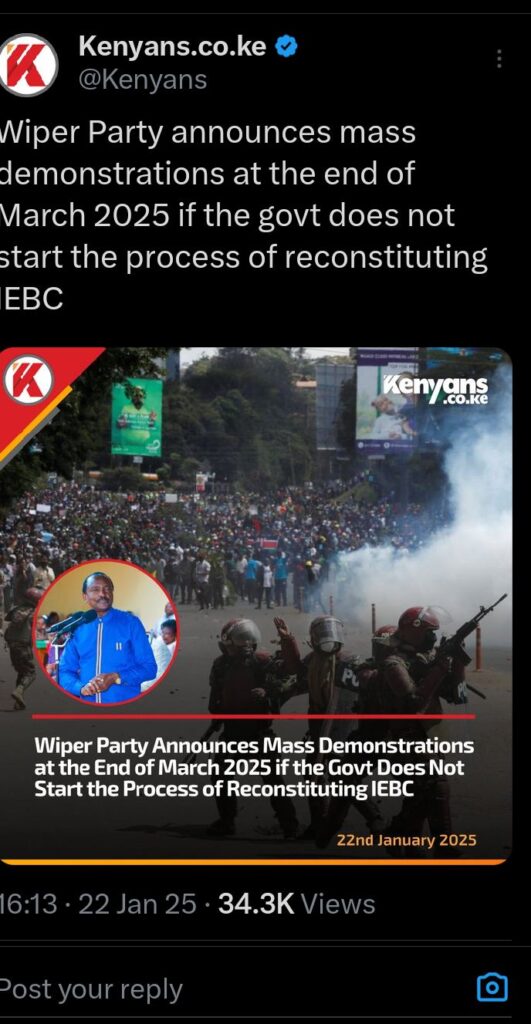The Wiper Party has officially announced plans to hold mass demonstrations at the end of March 2025 if the government fails to start the process of reconstituting the Independent Electoral and Boundaries Commission (IEBC).
According to the party leader, Kalonzo Musyoka, the current delay in restructuring the IEBC is a serious threat to the integrity of future elections and risks eroding public trust in the electoral system.

Musyoka’s statements came during a press conference where he strongly criticized the government’s apparent lack of urgency in addressing the issue.
Kalonzo Musyoka pointed out that the IEBC plays a central role in ensuring credible elections in the country.
Without reforms, he argued, the commission is unlikely to deliver fair and transparent electoral processes.
He stated that the government’s inaction not only puts future elections at risk but also raises questions about its commitment to democracy.
Musyoka stressed that the time for reforms is now, urging the government to prioritize this matter before it spirals into a larger political crisis.
If nothing is done, the Wiper Party and its supporters have vowed to take to the streets in a bid to pressure the government into action.
This call for demonstrations comes amidst mounting frustration from opposition parties and civil society groups who share similar concerns about the IEBC.
For years, the commission has been criticized for alleged inefficiencies and a lack of independence, particularly in managing previous elections.
Many stakeholders believe that unless the IEBC is reconstituted, its ability to oversee credible electoral processes will remain questionable.
Opposition leaders, including Musyoka, have argued that reforms are not just necessary but urgent, as the country approaches key political milestones.
The Wiper Party’s announcement adds to the growing political tension in the country.
With demonstrations planned for March 2025, pressure is mounting on the government to act swiftly to address the concerns raised by the opposition.
The proposed protests are likely to draw significant attention, as they reflect a broader dissatisfaction with the government’s handling of electoral reforms.
Despite the gravity of the issue, the government has yet to make an official response, further fueling suspicions of deliberate delays.
As political pressure builds, the risk of mass unrest cannot be ignored.
Public confidence in the electoral process is already fragile, and the failure to reform the IEBC could deepen divisions within the country.
Opposition leaders are urging the government to act decisively and avoid a potential crisis that could disrupt national stability.
At this stage, all eyes are on the government to see whether it will address these pressing concerns or allow the situation to escalate further.
The coming weeks will be crucial in determining the direction of this standoff and its implications for the nation’s democratic future.
